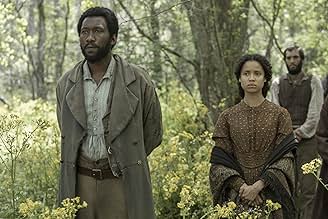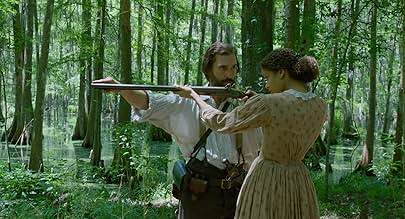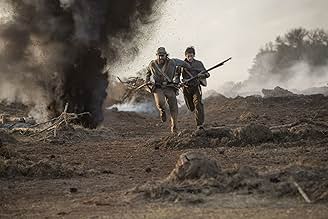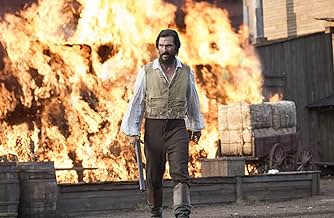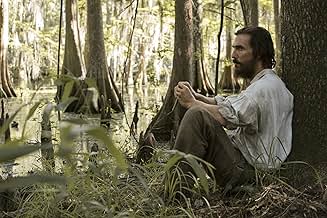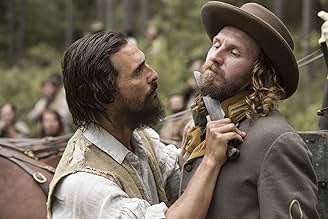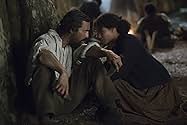Free State of Jones
Un désenchanté désabusé déserteur de l'armée confédérée retourne au Mississippi et dirige une milice de déserteurs et de femmes dans un soulèvement contre le gouvernement confédéré local cor... Tout lireUn désenchanté désabusé déserteur de l'armée confédérée retourne au Mississippi et dirige une milice de déserteurs et de femmes dans un soulèvement contre le gouvernement confédéré local corrompu.Un désenchanté désabusé déserteur de l'armée confédérée retourne au Mississippi et dirige une milice de déserteurs et de femmes dans un soulèvement contre le gouvernement confédéré local corrompu.
- Réalisation
- Scénario
- Casting principal
- Récompenses
- 3 victoires et 4 nominations au total
- Annie
- (as Jessica Collins)
- Wilson
- (as Donald Watkins)
Avis à la une
The movie starts pretty much like any Civil War movie with battles, death and bloody bodies, but it progresses past that to the point where some people rebel against the Confederacy for the atrocities they commit against the southern farmers. The story is well told with some actual dates and facts flashed on the screen from time to time which sort of gives it the feel of a documentary. It helps keep things in perspective without being intrusive.
If I had anything to complain about, it would be then length and scope of the film. The movie ran about 2-1/2 hours. At about 2 hours, I thought it was over but then it moved into the Klan, voting intimidation and general mistreatment of the freed slaves as well as having a 100 year tie in to future generation. It was as if they tried to jam these events in to make it more politically acceptable to Hollywood. I just felt that they went beyond what the movie was actually to be about.
The phrase "rich man's war,poor man's fight" never had more meaning than in the situation Knight finds himself in. He just walks away from the Confederate army and before long he's heading a movement back home seceding from the seceding Confederacy. Jones County opts for its own independence.
As played by Matthew McConaughey we see Knight certainly a person of humble circumstances who like Abraham Lincoln is a man who recognizes some great moral issues. McConaughey is humble and modest, but overwhelming in his portrayal. This film might get him a trip to the Oscars.
The two women in his life wife Keri Russell and Gugu Mbatha-Raw, the former slave who develops a relationship with McConaughey are also quite moving in their portrayal. Interracial relationships put McConaughey way ahead of his time. There is a modern story of one of his descendants unable to marry because of Mississippi's miscegenation laws post World War II. I'm not sure it was necessary for this film it kind of interrupted the flow of the main plot. In any event it probably deserved its own film.
Down the cast list there is a very moving performance by young Jacob Lofland in the beginning of the film as a young Confederate soldier who with McConaughey also realizes what business has he in a fight to protect some plantation owner's right to have slaves. You won't forget it if you see Free State Of Jones.
And you should see it.
Free State of Jones is a very entertaining film for its performances. Mathew McConaughey is often joked about for his intense style but in this role is where you can see why he's an Academy Award winner. Never mind those impersonations of him. He is John Woodroof, he is Newton Knight. There are also very astute performances from Gugu Mbatha-Raw and Mahershala Ali. It has a slew of characters like in any historical drama but thankfully all are in proper proportions. No wonder it comes from the director of The Hunger Games! Another striking quality of the movie is the soundtrack. Use of traditional as well as original songs bring a noticeable gravity to the narrative.
Apart from the brilliant cinematography and direction, this movie has a unique perspective to dealing with a subject as sensitive as this. It transcends the time and period when this story takes place. While the main thread of the narration tells the legendary story of Knight who goes absconding from confederate army and later creates the Free State of Jones in the midst of raging American Civil War, the other thread follows his great-great-great grandson Davis Knight undergoing trial for mixed-race marriage. Yes, even after 85 years, it was still an issue. When you watch it, you'll find the ridiculousness of it, all the more blatant. Well, this review does not mean to judge the laws of the land nor the way of life of the society. However, if at all you are concerned about the historical accuracy of the film then you should know that its one of the very few period dramas that carries this impressive a list of academic consultants to its credit.
The story of the Free State of Jones is not merely fascinating. It's a glorious story of a glorious man. Much like his namesake who discovered theory of Gravity, Newton Knight discovers something about man. You may understand why it could be discomforting to watch if not with an open mind. It is a jab at the ages of segregationist politics, but unlike most films with liberal agendas, it is not cryptic and morose. Its too direct. Too simple to fathom. It doesn't paint Newton Knight as the saviour but only as a hero that he is. He is as deceived and victimized by the system as everyone else. Only difference is that he had an idea way ahead of his times and he had a chance to implement it. Nature was in favour of the man and even when the times were exceptionally odd for his principles to find ground, he endured. Newton Knight went on to live to a ripe old age of 84 which in itself is astonishing in the 1800s. Thank you Gary Ross for sharing this incredible story on silver screen. Too bad it didn't do well commercially.
It's easy to see why the mass audience didn't like this movie. It's too long, it covers too much ground, and while Matthew McConaughey gives the role of ex-Confederate freedom fighter Newton Knight everything he's got, the character just doesn't jump off the screen like Charlton Heston in BEN HUR or Mel Gibson in BRAVEHEART. Newton Knight is just a lovable guy from the word go (we first see him hugging a scared boy on the battlefield, then holding him while he dies) and he has no personal demons (or prejudices) to overcome. He's not driven by personal anger or passion, just by an abstract love of justice.
Related to that problem is the fact that Newton Knight doesn't square off with one single baddie who's tough enough to make it a real fight. Judah Ben Hur goes up against Massala in the chariot race, and they have a whole lot of personal history. William Wallace goes up against Longshanks, Edward I of England, who is so terrifying he almost jumps off the screen. But Newton Knight just fights a bunch of no-name dastardly Confederate officers, most of whom are portrayed as cowardly or incompetent. None of them have any personal grudge against him and no personal magnetism of their own.
So the bottom line is that the general audience was bored to death.
Now with critics I think the story is a lot more sinister. A lot of left wing critics tried to put this movie down as a "white savior" movie in which a perfect white guy has all the answers and saves everyone. The problem with that argument is that it would apply equally well to a movie like GLORY which covers similar events in the exact same time period. But none of the critics ever attacked GLORY or patronized the personal story of Robert Gould Shaw the way they patronized the story of Newton Knight.
And there's a reason why. Robert Gould Shaw, the hero of GLORY, was a real life officer in the Union army. He was a Harvard graduate from a very genteel, distinguished Boston family who volunteered to command black troops and died leading them in a desperate charge against hopeless odds. Nothing wrong with that man's story. But did you notice the words "Harvard" and "Boston" and "distinguished family?" THAT'S the kind of white savior a left-wing film critic can love.
Someone just like them!
The thing about Newton Knight that turned off a lot of big name critics, (like Richard Brody of the New Yorker) is that he's not Robert Gould Shaw. He's not Harvard. He's not Boston. He's not even a West Point man like Grant or Sherman. Newton Knight isn't a white savior, he's poor white trash. Those kind of people are trash -- and they're supposed to ACT like it!
The idea that a poor redneck farmer would make common cause with a bunch of runaway slaves (without government supervision or a liberal college degree) is just as frightening, just as terrifying, to a New York film critic as it would be to a Mississippi planter. Without poor whites to blame for racism, privileged white liberals have no way to justify their privilege. So it's a fundamental article of faith with them that all poor whites are beyond redemption -- a basket of deplorables, as it were.
If you don't believe me, look up a piece Katha Pollitt published in THE NATION in November 2018. It's called "Conservative White Women Won't Change Their Minds," and it's basically a hate-filled rant against all the white women who voted for Trump. But the real point of the article is that changing their minds is a waste of time. Katha Pollitt needs the white trash to stay trash. All her self-esteem depends on the belief that poor whites were and are and will be trash, now and forever.
This movie proves that isn't true -- and that's why leftist critics had to bury it.
The movie tells of a counter-rebellion in a Mississippi town during the Civil War, and is based on a true story. The film is done in a style that emulates "Twelve Years A Slave", and as such it deals with topics of slavery and secession in a way that is poignant but also constructive.
In fairness, there are a few things that the film could be rightly critiqued for. The opening scenes of the film are fairly gory and filled with wartime violence, but fortunately that does not dominate the movie. As it progresses, the plot of the film does meander a bit, including a fast forward to a scene from some 85 years after the majority of the film that is interspersed throughout the rest of the movie. That technique felt a bit forced at times, but at the end of the film it made more sense why it had been used.
Additionally, the movie tells its main tale over the course of more than a decade, which makes for a bit of an odd cinematic journey--but, in my view, none of these issues are so problematic that they greatly take away from the movie. Rather, what we have here is a film that was desperately trying to be Oscar worthy, and that perhaps pushes the creative envelope a tad bit too far.
But again, there is more good here than bad. The story that the movie has to tell is both engaging and important--engaging in that it captures your attention and makes you care about the subject matter in a captivating way, and important in that it draws attention to historical facts that you probably were not aware of. I know it certainly highlighted some elements of Reconstruction that were new to me.
Regarding acting, this was perhaps not McConaughey's best role, but it's also not his worst. The supporting cast turns out a strong performance, and all in all the movie is well made.
That said, I'm going with 8/10 stars on this one. It's not the best Civil War flick ever made, and perhaps pales in comparison with other recent historical dramas like "Twelve Years" and "The Revenant", but it's nevertheless a great movie that deserves a "Very Good" score.
Le saviez-vous
- AnecdotesIn 2016 a document was discovered in the National Archives which was a request by Newton Knight's company to join the Union Army in 1864. It lends validity to Knight's claims.
- GaffesWhen the plantation owner comes back home after the war and walks through the front door, a thermostat is visible on the wall to his left.
- Citations
Newton Knight: From this day forward we declare the land north of Pascagoula Swamp, south of enterprise and east to the Pearl River to the Alabama border, to be a Free State of Jones. And as such we do hereby proclaim and affirm the following principles. Number one, no man ought to stay poor so another man can get rich. Number two, no man ought to tell another man what you got to live for or what he's got to die for. Number three, what you put in the ground is yours to tend and harvest and there ain't no man ought to be able to take that away from you. Number four, every man is a man. If you walk on two legs, you're a man. It's as simple as that.
- ConnexionsFeatured in The History of Jones County (2016)
- Bandes originalesBeautiful Dreamer
Written by Stephen Foster
Meilleurs choix
- How long is Free State of Jones?Alimenté par Alexa
Détails
- Date de sortie
- Pays d’origine
- Sites officiels
- Langue
- Aussi connu sous le nom de
- Lucha por la libertad
- Lieux de tournage
- Sociétés de production
- Voir plus de crédits d'entreprise sur IMDbPro
Box-office
- Budget
- 50 000 000 $US (estimé)
- Montant brut aux États-Unis et au Canada
- 20 810 036 $US
- Week-end de sortie aux États-Unis et au Canada
- 7 572 206 $US
- 26 juin 2016
- Montant brut mondial
- 25 035 950 $US
- Durée2 heures 19 minutes
- Couleur
- Rapport de forme
- 1.85 : 1
Contribuer à cette page








